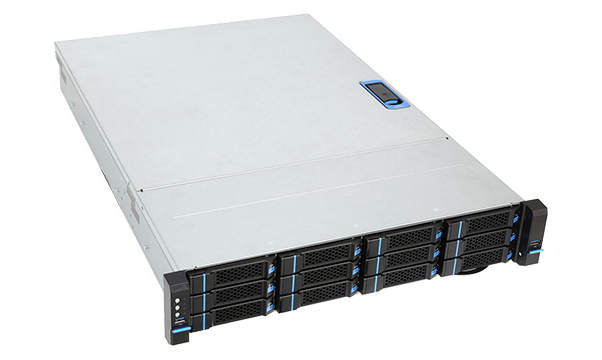
vCluster Distributed Storage
vCluster Distributed Storage is a distributed storage product with the best performance and the most complete functions in China. It has more than 100 functions than some popular open-source distributed software and more than 30 optimized functions. The vCluster distributed storage series has greatly improved storage efficiency, as it adopts an advanced distributed architecture that allocates one task to multiple storage nodes for parallel processing. Its stackable and modular design has improved the robustness and scalability of storage, which is in line with the IT architecture development trends for enterprise storage from now to the future.
Product advantages

Extreme performance
Fastest speed: Single storage with a maximum bandwidth of up to 1GB/s which is three times that of similar products.
Highest concurrency: A single system can support tens of thousands of rendering servers to read and write concurrently
Most complete function: most complete storage functions, including parallel storage, automatic hierarchy, and second deletion of massive small files

Extreme security
Flexible: support a variety of data protection modes, including snapshot, remote disaster tolerance, copy, and erasure.
Reliable: support disk-level, node-level, cabinet-level, and data center-level redundancy.
Fast: online automatic reconstruction and multi-node reconstruction of lost data at the same time, which is 10 times faster than RAID and has no impact on the front-end businesses.

Extreme compatibility
Storage type: support three storage types, respectively block level, object level, and file level.
Multi-client: support a variety of operating systems, such as Windows and Linux.
Interface protocol: support a great variety of protocols, including NFS, CIFS, iSCSI, HDFS, FTP, HTTP, S3, Swift, and POSIX
Product features
Usage scenarios
Related cases
Product specifications
| Product model | vCluster-2U12 | vCluster-4U24 | vCluster-4U36 | vCluster-4U60 | vCluster-4U90 |
| Processor type | Intel multi-core processor | Intel multi-core processor | Intel multi-core processor | Intel multi-core processor | Intel multi-core processor |
| High-speed cache | 32-512GB cache | 64-1024GB cache | 96-1024GB cache | 192-512GB cache | 256-512GB cache |
| Supported hard disk type | Enterprise SSD/SAS/SATA hard disk | Enterprise SSD/SAS/SATA hard disk | Enterprise SSD/SAS/SATA hard disk | Enterprise SSD/SAS/SATA hard disk | Enterprise SSD/SAS/SATA hard disk |
| Network data interface | 2*1GbE (may be upgraded to 4*1GbE ) | 4*1GbE (may be upgraded to 2*10GbE) | 2*10GbE | 4*10GbE | 4*10GbE |
| Number and specification of disks | 12 SSD/SAS/SAT Node A (disks) | 24 SSD/SAS/SAT Node A (disks) | 36 SSD/SAS/SAT Node A (disks) | 60 SSD/SAS/SAT Node A (disks) | 90 SSD/SAS/SAT Node A (disks) |
| Maximum storage capacity | 72PB | ||||
| Total number of files | > 10 billion | ||||
| Maximum file supported | 32TB | ||||
| Access protocol | iSCSI, NFS, CIFS, FTP, HTTP, POSIX, S3, and SWIFT | ||||
| Copy number | 2-12 | ||||
| Erasure support | N(support up to 18 nodes)+M (1, 2, 3, and 4 nodes) | ||||
| Maximum volume number | 1024 | ||||
| Maximum snapshot number | 1024 | ||||
| Single name space | A unified storage access directory and space | ||||
| Load balancing | Storage load balancing and access load balancing | ||||
| Online expansion | Support online horizontal/vertical storage node expansion | ||||
| Automatic recovery | Support the automatic migration and recovery of failure nodes and hard disk data without manual intervention | ||||
| Intelligent monitoring | Support the monitoring of a variety of detailed running status, including overall storage status, storage node status, hard disk status, and network status | ||||
| Management interface | CLI and Web-based graphical user interface | ||||
| Alarm function | Email, log, and SNMP | ||||
| Thin provisioning | Support excessive capacity assignment technology | ||||
| Quota management | Support directory - and user-based file number and storage capacity quota technology | ||||
| Automatic grading | Optional; support media of different performance to create different storage pools, and periodic statistics of IO to achieve dynamic file migration | ||||
| WORM | Optional; support the mode of single writer multiple readers to protect files from tampering | ||||
| Snapshot | Support directory and LUN timed snapshot, manual snapshot, and LUN readable and writeable snapshot | ||||
| Remote copy | Optional; support directory-based synchronous and LUN asynchronous remote copy | ||||
| NDMP | Optional; support mainstream backup software and tape libraries, such as Veritas NBU and CommVault | ||||
| Fault domain | Support fault domain division based on node, cabinet, and machine room | ||||
| NFS interface refactoring | Support high-performance NFS access interfaces | ||||
| Windows client | Support Windows 2008/2012 clients to provide higher read/write performance or scalability in a concurrent manner | ||||
| Anti-virus | Optional; support real-time scanning of the file sharing directory with Rising AntiVirus | ||||
| Storage virtualization | Support heterogeneous management and virtualization of storage in FC SAN and IP SAN mode | ||||
| Volume QoS | Support online change, QoS access and data recovery restriction of volumes and QoS management; allow configuration of policies, such as fault migration or business access priority and fault migration rate, during the disk or node failure, and allow designation of storage pool and IOPS and bandwidth upper limit setting for volumes. | ||||
| Lun multipath | Support more than 2 MPIO paths to provide business access security | ||||
| Volume management | Support the creation, deletion, and mounting as well as the online capacity expansion and copy of volumes | ||||
| Lun security | Support iSCSI CHAP authentication and authorization to prevent unauthorized access and provide data access isolation function | ||||
| High-performance media support | Support different high-performance media, such as SSD and PCI-E card, to create a variety of storage pools based on main memory or cache | ||||
| Unified storage | Provide capabilities of access to files, blocks and objects and support S3 and Swift object access; fully compatible with files, blocks and objects, such as HDFS and OpenStack. | ||||
| High access availability | High-availability access functions available for file, block and object access interfaces to achieve uninterrupted business access. | ||||
| Cache management | Caching capabilities, such as caching read and caching write, available to increase the data hit ratio and improve the overall performance of storage; compatible with the main stream SSD, PCI-E, and NVME disks. | ||||
| Disk management | Support S.M.A.R.T detection and slow disk detection; can find bad disks and defective tracks effectively and quickly and give fault warning in advance; support disk roaming, hot plug, disk localization and other functions | ||||
| SSD management | Life management functions available for the mainstream SSDs, PCI-E cards and NVME disks, etc. by monitoring the total amount of data written and the continuous running time | ||||
| SNMP support | System log, SNMP and SMS available; allow configuration of CPU utility, used space, read/write bandwidth, IOPS, latency, concurrency, and critical services at the system, node, and user levels and user definition of alarm type, alarm level, and recovery notification; can dock the centralized network management platform and synchronize and report the alarm information timely through SNMP V2/V3 to achieve unified operation and maintenance management and centralized alarm view, performance management and configuration operations. | ||||
| Storage upgrade | Online upgrade storage system and repair patches available; can realize automatic distribution of upgrade packages and automatic deployment grading through the built-in software of the system; will not cause data loss or affect the business system access during the upgrade. | ||||
| Virtualization support | Support virtualization technologies, such as KVM, VWware, Xen, and HyperV, etc.; standard blocks and file copy interfaces available for virtualization, and original block devices available for virtual machines; compatible with OpenStack Kilo version and the later versions up to the latest version; Cinder Driver and Cinder-Volume standard interfaces available. | ||||
| VAAI support | Support the VMware VAAI function, which can greatly reduce the occupation of virtualized host resources and the use of network bandwidth, including Full Copy, Block Zero, and Hardware Assisted Locking (ATS) | ||||
| Object storage quota management | Object storage and access buckets and user quota management available, including the number of objects and the capacity size. | ||||
| Object storage permission management | Access functions, such as sub-user (SWIFT), permission and key, as well as bucket access permission management. | ||||
| Object storage multi-site access | Support asynchronous data replication among multiple cluster systems to achieve multi-address disaster tolerant access to objects and buckets. | ||||
| Multiple storage pools for object storage | Allow the creation of a new storage pool during the scaling of a storage bucket to enable the bucket to use the old and new storage buckets simultaneously, so that the data can be rebalanced during the capacity expansion | ||||
| Object storage bucket access log | Statistical functions of data usage space, upload and download traffic, upload and download times and so on available at system level, user level and bucket level, and bucket download access logs and access permissions control available. | ||||
Apply for trial quickly within just 10 seconds.
Apply for Trial






 CN
CN



 Home
Home


















